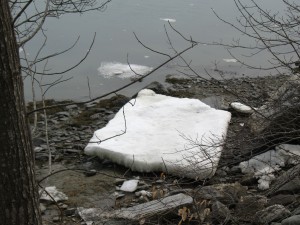Neil Sedaka and Henry Thoreau – not your usual pairing. Still, both share a fascination with iced water’s set world. And with the grip it has on us. Both also wrote words, lyrics, that can take over the mind.
So it was that during our one-day spring (55 degrees!) last Friday, I approached our nearby bay at the shuffle-pace I call running. The snow’s remainders lay in thick strips of drift across the tan fields, and, having just returned from southern sojourn, I was wondering what I’d find. In mid-March, when we’d left in search of spring, the ice on the bay was more than a foot thick, and it stretched beyond the islands a mile off shore; I’d watched a family ski on (frozen) water out to those islands. Not, as we can all agree, a usual winter.
Through the barely budded trees, I could see the water, and it was streaked with white. Ice still!, I thought. As I drew nearer, I saw also gaps in that white, leads of open water colored greeny gray. A low rustling sound rose from the bay – ice rubbing ice, wearing itself away. Neil Sedaka’s lyrics popped into my head (and they are still there): breaking up is hard to do.
Out on the water, a pair of ducks paddled up to one miniature berg and clambered aboard, settling into contented crouch as their small world was jostled by others. A sheet of ice as big as a playing field floated seaward, impelled, it seemed, by some invisible force. Gulls cried through the air. The whole bay was alive.
As I left to return to my shuffle, I tried to force Neil Sedaka from my mind by thinking about Henry Thoreau and his break-up stories of Fairhaven Bay, the expanse of the Sudbury River broad enough to behave like the sea sometimes. Invariably, Thoreau’s spring journals arrive at Fairhaven to chronicle its break-up.
The winter of 1856 bore good resemblance to this year’s – March stayed cold, the snow was deep, ice thickened even as the light grew longer. Thoreau was out and about measuring the ice (nearly two feet thick on Walden) and walking still down the Sudbury’s center in late March. Still, as his long entries about spring signs make clear, he was eager for and alive to the new season.
On April 7th he finally was able to launch his boat:
Launched my boat, through three rods of ice on the riverside…Up river in boat…The first boat on the meadows is as exciting as the first swallow or flower. It is seen stealing along in the sun under the meadow’s edge. One breaks the ice before it with a paddle, while the other pushes or paddles, and it grates and wears against the bows.
And on April 8th, he reached Fair Haven Pond:
By the side of Fair Haven Pond it was particularly narrow. I shoved the ice on the one hand and the bushes and trees on the other all the way…For all this distance, the river for the most part, as well as the pond, was an unbroken field of ice.
“Comma comma down doobie do down down,” I half-sang, “comma comma down…” and my feet aligned their steps to Sedaka’s song.
Breaking with this song is as tough as slipping the grip of winter; O, this will not end soon, I thought. And clearly these days later, even as our ice retreats, it hasn’t.
Breaking up is hard to do. Comma comma…
Added note: a while later, in a tree at a field’s edge, a bluebird sang, then flew, its sky-blue back flashing in the sun.


